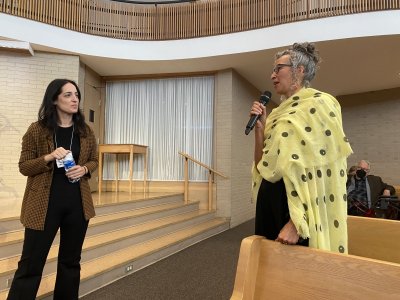Writers’ conference at age 32 looks back, considers what comes next
While there was much looking back over 32 years, the ninth Mennonite/s Writing Conference at Goshen College Sept. 20 to Oct. 2 was very much about passing the torch to the next generation.
Originally scheduled for 2020 to celebrate the 30th anniversary of the first Mennonite/s Writing in 1990, and twice postponed by COVID concerns, the conference drew Mennonite- and Anabaptist-related writers, readers and scholars from all over North America.
Hildi Froese Tiessen, professor emeritus at Conrad Grebel University College in Waterloo, Ontario, helped plan the first conference at the University of Waterloo and has been on the planning committee for all nine of them.
Reflecting on 32 years at the Saturday night banquet, she acknowledged, first off, the “vast array of talented, creative and critical voices” from those years – many of them present, and already published, in 1990 and many more who have emerged since.
There are currently “three or four generations of Mennonite writers active, not just the young ‘Mennonite Miracle’ writers” of the 1970s and 1980s (most of them Canadian, of Russian Mennonite heritage, such as novelists Rudy Wiebe and Sandra Birdsell, and poets Di Brandt and Patrick Friesen).
And it was, in fact, the “third and fourth generations” who occupied center stage at this ninth Mennonite/s Writing.
Fiction writer Casey Plett, a trans woman, gave the opening keynote on Thursday evening of the conference. Plett grew up in western Canada, “of Mennonite Brethren, Evangelical Mennonite Brethren and Kleine Gemeinde heritage.”
Considering “the narratives we create, choose, use and pass on,” she asked, “What narratives have had a throughline of 32 years? What are emerging for the first time this weekend?”

On Friday morning, Goshen College graduate Sofia Samatar, now a professor at James Madison University in Harrisonburg, Va., read from and spoke about the process of writing her just-published memoir The White Mosque – recently named a “Best Book of the Month” by Time magazine.
Samatar wrote the book after traveling to Uzbekistan in 2016 on a “Mennonite heritage tour” that retraced the Great Trek, when Russian Mennonites followed the “prophet,” Claas Epp Jr., to central Asia in expectation of the return of Christ in March 1889.
Samatar went on the tour even though the “heritage” was not hers, as the child of a Somali Muslim and a Swiss-German Mennonite.
Rather, The White Mosque is about “a personal but not a biological connection,” Samatar said. “It was intimate, emotional, about identity formation.”
The Saturday afternoon plenary featured Rachel Yoder, who grew up in a Mennonite intentional community in southeastern Ohio, reading from her highly acclaimed 2021 novel Nightbitch, followed by a conversation with Sheri Hostetler, a writer and Mennonite pastor from San Francisco.
In Nightbitch, a young woman grappling with the huge changes of new motherhood suspects she is shape-shifting into a dog that leaves the ravaged bodies of small animals on the front porch overnight.
“Being a mother isn’t the horror,” Yoder said. “It’s the institution that our society has made it into.”
Throughout the conference, concurrent sessions dealt with topics such as speculative fiction; spirituality in poetry; sense of place in creative nonfiction; humor in writing and performance (drama, blogs, podcasts); theopoetics; and translating Mennonite writing, among much else.

Participants could hear papers on “Mennonite noir” fiction, poetry of Plain people, writing Mennonite hymn texts, and more.
Additional plenary sessions included a reading by poets published by Cascadia Publishing; a performance of Poland Parables, text by Connie Braun and music by Carol Ann Weaver, featuring mezzo-soprano Mary-Catherine Pazzano; and a 50(ish)-year celebration of Goshen College’s small press, Pinchpenny, with readings by authors present at the conference.
In addition to Tiessen’s retrospective, the Saturday night banquet included tributes to Tiessen; writer and publisher Victor Enns (Rhubarb magazine); publishers and promoters of the arts Merle Good and Phyllis Pellman Good; cultural critic Magdalene Redekop; and writer and teacher Raylene Hinz-Penner, as well as a reading by Patrick Friesen.
The conference concluded with a panel and audience discussion wrapping up the weekend and looking into the future, or even if there is one, of Mennonite/s Writing.
There was much appreciation expressed for finally being able to have the conference in-person, as well as recognition that for it to move forward it will take new energy and ideas, some of which will likely be in digital and social media form.
Abigail Carl-Klassen, an oral historian from an Old Colony Mennonite context in Seminole, Texas, said, “I grew up not knowing there was such a thing as ‘Mennonite writing.’ My gateway was [the poetry of] Julia Spicher Kasdorf when I was at the University of Texas, trying to figure out what to do with the stories from my community.
“I felt here an invitation to participate, to take active agency. I hope we can move forward with an open hand.”
— by Melanie Zuercher, on behalf of Goshen College




